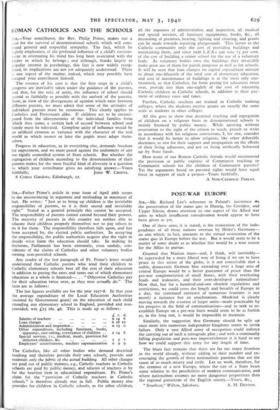ROMAN CATHOLICS AND THE SCHOOLS
SIR,—Your contributor, the Rev. Philip Prime, makes out a case for the survival of denominational schools which will com- mand general and respectful sympathy. The fact, which he rightly emphasises, of the profound influence of a child's environ-
ment in orientating his mind has long been associated with the Order to which he belongs ; and although, thanks largely to popular interest in psychology, this fact is now widely recog- nised, its implications are not yet adequately understood. There is one aspect of the matter, indeed, which may possibly have escaped your contributor himself.
The essence of his case is that the first steps in a child's progress are inevitably taken under the guidance of the parents, and that, for the sake of unity, the influence of school should accord as faithfully as possible with the outlook of the parents. Now, in view of the divergencies of opinion which exist between different parents, we must admit that some of the attitudes of individual parents mtist be erroneous. This clearly applies to Catholics and Protestants alike. If children are to be emanci- pated from the idiosyncrasies of the individual families from which they come, a certain lack of accord between school and family must be tolerated. Complete unity of influence would be an artificial creation at variance with the character of the real world to which sooner or later the pupils must adapt them- selves.
Progress in education, as in everything else, demands freedom for experiment, and we must guard against the uniformity of any too rigidly controlled system of State schools. But whether the segregation of children according to the denominations of their parents makes for the most fruitful kind of diversity is a question to which your contributor gives no satisfying answer.—Yours faithfully, JoHN W. CRons.
6 Coates Gardens, Edinburgh, 12.


































 Previous page
Previous page